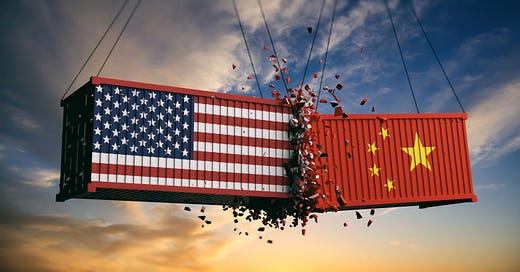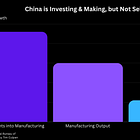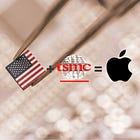Some Things Won't Change Under the Next US President
[Opinion] They didn't start the fire. It was always burning.
Good evening from Taipei,
There’s a deep sense that the future of the world depends on who will occupy the White House for the next four years.
The winning candidate has hinted at nixing the CHIPS Act while also looking like they may sell out American economic & democratic ideals to placate foreign dictatorships. The losing candidate was just as likely to continue falling prey to corporate hypocrisy, while also following misguided policies in the belief they’ll achieve supply chain resilience & national security.
But numerous stark realities were already apparent, and are unlikely to change based on who gets sworn in as POTUS 47:
Trade Routes Are Changing
It’s tempting to credit, or blame, President Trump for igniting a trade war with China and upending the global economy during his first term. Truthfully, though, China was already getting more expensive and Beijing was well on the path toward its own form of protectionism. That spurred international customers to find alternative places to source their wares.
While China had been open to foreign investment in industries it didn’t already dominate, it started pilfering from or fleecing many of the foreign companies doing business locally many years ago. And forced licensing and joint ventures have been the norm for more than a decade.
That won’t reverse under the next US president. Chinese leader Xi Jinping’s paranoia, heightened by overt industrial nationalism and a need to stave off further economic troubles, means international buyers will keep diversifying. Vietnam and Mexico have already been major beneficiaries, while India ought to gain, too. More investment has flowed back to Taiwan and Eastern Europe is increasingly attractive.
Changes to the US tariff system could mean a realignment of the winners and losers amid a restructuring of global trade, but the broader truth is that trade relations between the world’s two-largest economies aren’t going to return to the way they were under either president.
Mexico Matters
Many Americans think of the US-Mexico border as a leaky sieve through which illegal immigrants and illicit drugs flow. Both candidates claim they’ll fix both, or pretend they aren’t really problems.
A bigger issue is the structure of Mexico’s manufacturing sector. One ongoing concern is that Mexico will be a front for Chinese goods to get smuggled into the US under the guise of nearshoring. As Alex González Ormerod writes in The Mexico Political Economist, a lot of this fear is overblown. But that doesn’t mean the concern isn’t valid or ought to be dismissed. Relabeling — swapping badges saying “Made in China” for those that read “Made in Mexico” — has been around for at least five years. It is a thing. The only debate is how much of a thing it really is.
Broadly speaking, though, it matters less whether products are truly made in Mexico and more that an increasing amount of stuff is being shipped to and sourced from south of the border. The undeniable fact is that supply chains are shifting to Mexico. Foxconn, the Taiwanese company which makes iPhones, PlayStations and 5G base stations, is in the process of building the world’s largest AI-server factory in Mexico. The client there is Nvidia, and it’s no coincidence that Foxconn does not make Nvidia AI servers in China, despite having the vast majority of its operations there.
In addition, as I wrote in a previous life, global shipping is being reoriented toward Mexico. New routes are being added and the frequency of sailings across existing routes is increasing.
Finally, there’s Chinese companies themselves setting up shop in Mexico. Chinese made up 5.6% of the residents of Mexican industrial parks last year, according to a survey by BBVA. Another 8% came from other parts of Asia. That’s not a lot, to be frank, yet the same survey found that China would be the source of 20% of new tenants over the next two years.
Defense Industry Shake Up
Palmer Luckey could end up being the most consequential industrialist in the US over the next decade, even replacing Elon Musk. [Pause to consider the irony of that statement given the latter’s role in this election.] Luckey shot to fame with the founding of Oculus, the VR headset company which he later sold to Meta — and subsequently got booted from. Startup Anduril Industries is his latest venture, and it’s severely disrupting the military sector in the same way that SpaceX impacted the aerospace industry. You could think of it as a mix of Palantir and SpaceX given the way its team is combining AI, software, and a lean, cost-down approach to operations.
Among the company’s first contracts was a surveillance system for the US border. Since then it’s moved into drones — both aerial and underwater — for both reconnaissance and combat. In addition to the US government, Anduril has secured orders from abroad, with Taiwan among the latest customers. The Californian company isn’t alone in bringing a renewed nimbleness to the arms industry. Russia’s invasion of Ukraine and heightened concerns over China’s belligerence toward Taiwan have spurred a bevy of businesses offering quick, cheap and innovation weapons.
An armada of voices claiming the US has dropped the ball on defense development has only added to the urgency and demand for new approaches to weaponry. It won’t really matter who the Command-in-Chief is, there’s enough need domestically and abroad for armaments that this trend likely won’t be reversed within the next four years.
Cars Are Driving Global Politics
The Joe Biden administration kicked off new curbs on Chinese cars, but he’s not alone in showing concern. Governments across the globe are going to bat for their auto sectors. These are massive employers and drive local and national economies. But the threat from China, and the inability of behemoth incumbents to keep up with the trend toward new-energy vehicles, is causing schisms among allies. The EU went ahead with tariffs on Chinese EVs despite objections from Germany, the world’s largest car exporter. Berlin’s reticence stems from its own fear that Beijing could retaliate, and such a move would hurt Germany far more than other EU member states.
This dynamic will play out again in coming years, across many sectors.
Vehicles are one of the world’s most-traded products, and they’re often a source of national pride. That makes the sector politically sensitive, and thus open to exploitation from foreign governments. China is a huge trading partner, yet it’s a huge economic and political threat. Whoever runs the show in DC will need to be aware of Beijing’s interest in manipulating the narrative and playing friends off against each other.
It’s easy to think of leaders as having a huge influence on a nation’s direction, and there’s certainly a huge difference between America’s presidential choices this year, but many trends were in place well before this US election.
That said, it’s worth remembering that although they didn't start the fire, we can still try to fight it.
Thanks for reading.
Other work you may have missed:











Unsubscribing. Dictator comments are typical leftwing wing nonsense.